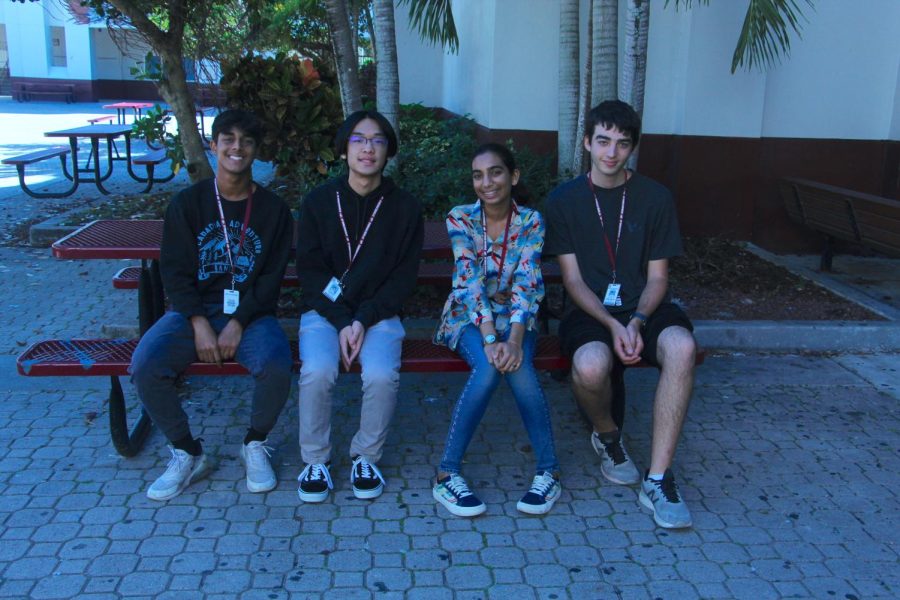National Merit semifinalists sit together. The four MSD students- seniors Jason Choy, Nabeeha Haque, Rushil Kothur and Joshua Schwartz- were among the roughly 16,000 semifinalists.
Four MSD students have been announced as National merit semi-finalists
In early September, National Merit semi-finalists were announced, including four seniors from Marjory Stoneman Douglas High School: seniors Jason Choy, Nabeeha Haque, Rushil Kothur and Joshua Schwartz.
The National Merit Scholarship program is an academic competition to earn financial aid for college. The National Merit Scholarship Corporation (NMSC), founded in 1995 by John M. Stalnaker, is in charge of running the National Merit Scholarship program. About 16,000 students are chosen annually to compete in the program, but only about 7,500 students can win the financial aid.
To qualify to compete in the academic competition, students first must partake in the PSAT/NMSQT. NMSC recommends students should check their PSAT/NMSQT score reports to see whether an asterisk appears next to their selection index scores. If an asterisk is present, then the student does not meet entry requirements for the National Merit Scholarship Program; students must score at least a 1400-1520, then the program chooses students with the highest scores as semifinalists to win a $2,500 college scholarship.
Some other requirements include signing up for the scholarship during their senior year of high school and being enrolled or having a plan to apply for full time at a college of their choice. Students also must take the PSAT in their third year of high school, usually junior year, as that is the score considered for the scholarship.
“I was ecstatic,” senior Choy said. “It had been a goal of mine since freshman year and to finally be able to achieve this goal validated that my preparation had worked.”
All Broward County schools participate in this event. Students should compare their responses on the entry requirements section of their score reports to those listed on the National Merit Scholarship Program page.
Some other requirements include, signing up the last year of high school and being enrolled or plan on applying for full time at a college of your choice. Students also must take the PSAT in their third year of high school, usually junior year.
The cutoff score for the class of 2023 is 216. But it’s recommended to score two to five points above the selection index because the requirement score tends to fluctuate between years.
“The scores for reading and math have to be equal to the selection index to the state to become a semi finalist,” Haque said. “To become a finalist you have to submit an essay, a recommendation letter, your transcript and fill out an application regarding your extracurricular activities and community service. Activities look better if you have been deeply involved with them for a while.”
The four semi finalists had done practice PSATs weeks before the actual test. Many resources such as the College Board offer PSAT prep.
“I think the practice tests were beneficial because the questions were a bit more difficult than the PSAT questions which made the actual test seem easier,” Haque said.
Now the four semi finalists have the opportunity to win the title of National Merit Scholar and a cash prize of $2,500 to go toward their college tuition. 95% of the semi finalists are able to become finalists, but the decision of who wins the title as “National Merit Scholar” is based on their submission.
